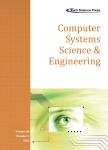An Advanced Dynamic Scheduling for Achieving Optimal Resource Allocation
作者机构:Department of Computer Science and EngineeringAAA College of Engineering and TechnologySivakasiTamilnaduIndia Department of Information TechnologyMepco Schlenk Engineering College SivakasiTamilnadu India
出 版 物:《Computer Systems Science & Engineering》 (计算机系统科学与工程(英文))
年 卷 期:2023年第44卷第1期
页 面:281-295页
核心收录:
学科分类:08[工学] 0812[工学-计算机科学与技术(可授工学、理学学位)]
基 金:The authors received no specific funding for this study
主 题:Cloud computing resource allocation load balance dynamic scheduling dimensionality reduction
摘 要:Cloud computing distributes task-parallel among the various *** with self-service supported and on-demand service have rapid *** these applications,cloud computing allocates the resources dynami-cally via the internet according to user *** resource allocation is vital for fulfilling user *** contrast,improper resource allocations result to load imbalance,which leads to severe service *** cloud resources implement internet-connected devices using the protocols for storing,communi-cating,and *** extensive needs and lack of optimal resource allo-cating scheme make cloud computing more *** paper proposes an NMDS(Network Manager based Dynamic Scheduling)for achieving a prominent resource allocation scheme for the *** proposed system mainly focuses on dimensionality problems,where the conventional methods fail to address *** proposed system introduced three–threshold mode of task based on its size STT,MTT,LTT(small,medium,large task thresholding).Along with it,task mer-ging enables minimum energy consumption and response *** proposed NMDS is compared with the existing Energy-efficient Dynamic Scheduling scheme(EDS)and Decentralized Virtual Machine Migration(DVM).With a Network Manager-based Dynamic Scheduling,the proposed model achieves excellence in resource allocation compared to the other existing *** obtained results shows the proposed system effectively allocate the resources and achieves about 94%of energy efficient than the other *** evaluation metrics taken for comparison are energy consumption,mean response time,percentage of resource utilization,and migration.



